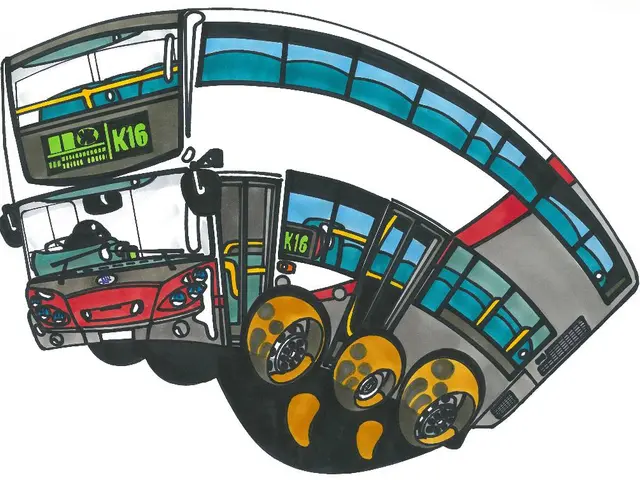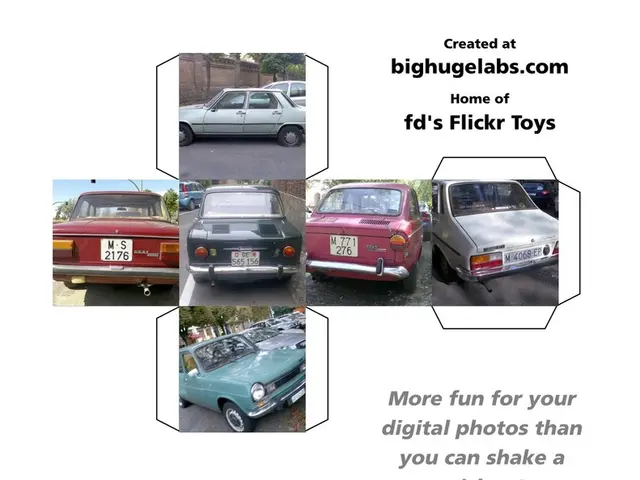Revealed: Leaders in the Auto Industry May Embrace Radical Changes for Efficiency, Akin to Apple's Game-Changing Outsourcing Model
Industrial Society's Oblivion: A World Devoid of Manufacturing Hubs
The auto industry is grappling with a slew of challenges. To boost efficiency, even traditional barriers could potentially fall by the wayside in the long run. Possible solutions span from the increased use of AI in administration to autonomous manufacturing, or even the abolishment of in-house factories.
By Daniel Schnettler, Frankfurt
Apple's path-breaking strategy has demonstrated a new route: A manufacturer need not have its own factories to successfully introduce products into the market. Might this model, popular in the electronics industry, be applicable to struggling automakers? Indications suggest this is an intriguing question companies are exploring, as a survey by management consultancy Bain among 300 European and North American executives seems to indicate.
A Peek at Apple's Strategic Blueprint
- Selective Supplier Partnerships: Apple consistently collaborates with a few reliable partners (like Foxconn, TSMC) who are involved in the product development process early, facilitating predictability and expediting the product development process [1][2][5].
- Prudent Vertical Integration: Apple exercises control over design and integration but farms out manufacturing, reducing capital expenditure and enhancing margins [2][5].
- Preservation of Intellectual Property: Apple safeguards ownership of all intellectual property, utilizing OEM relationships to execute production without surrendering control [5].
Assessing Transferability to the Auto Industry
| Factor | Apple (Electronics) | Automotive Industry ||----------------------------------|------------------------------------------|----------------------------------------|| Product Complexity | High, but design is modular | Extremely complex (thousands of parts, numerous regulatory constraints) || Supplier Involvement | Early, deeply integrated | Historically later, but escalating || Intellectual Property Ownership | Retained by Apple | Owned by automakers, but supplier IP is more prevalent || Capital Expenditure | Reduced through outsourced manufacturing | High due to manufacturing scale and safety requirements || Speed of Innovation | Swift (short product cycles) | Relatively slow (long development cycles) |
Compared to the auto industry's complexities, product complexity and regulatory requirements, the process might be more challenging for automakers to embrace Apple's outsourcing model entirely [1][4]. Nonetheless, key principles within the model are increasingly relevant to the auto industry as well and are being implemented in varying degrees by several manufacturers [1][4].
Final Thoughts
Core principles embedded in Apple's outsourcing model, such as strong supplier partnerships, early integration, and intellectual property protection, are becoming increasingly pertinent in the auto industry. However, the complexities, regulations, and established supply chain structures in the auto industry may limit the full transferability of Apple's model [1][2][4]. Researchers and industry analysts from Bain and other firms believe that while dramatic changes are being considered, progress will be gradual, and existing auto supply chain models may require significant modifications [1][2][4].
- As the auto industry faces numerous challenges, leaders may embrace radical changes akin to Apple's outsourcing model in the electronics industry for efficiency.
- In exploring this potential application, researchers and industry analysts suggest that key principles within Apple's outsourcing model, such as strong supplier partnerships, early integration, and intellectual property protection, are becoming increasingly pertinent in the auto industry.
- Despite the complexities, regulations, and established supply chain structures in the auto industry potentially limiting the full transferability of Apple's model, key automakers are implementing these principles in varying degrees.
- The future of the auto industry may see an increased use of artificial intelligence in administration, autonomous manufacturing, or even the abolishment of in-house factories as companies seek to boost efficiency, much like the shifts seen in the finance, technology, and transportation industries.








